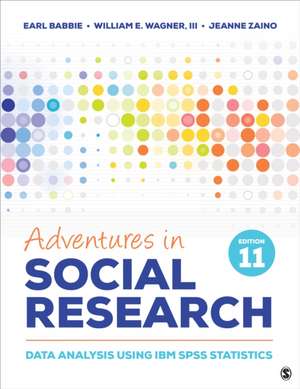Adventures in Social Research: Data Analysis Using IBM SPSS Statistics
Autor Earl R. Babbie, William E. Wagner, Jeanne S. Zainoen Limba Engleză Paperback – 9 mai 2022
Preț: 699.02 lei
Preț vechi: 944.61 lei
-26% Nou
133.85€ • 137.92$ • 112.32£
Carte disponibilă
Livrare economică 31 ianuarie-14 februarie
Livrare express 17-23 ianuarie pentru 47.05 lei
Specificații
ISBN-10: 154439800X
Pagini: 536
Dimensiuni: 216 x 279 x 29 mm
Greutate: 1.02 kg
Ediția:11th Edition
Editura: SAGE Publications
Colecția Sage Publications, Inc
Locul publicării:Thousand Oaks, United States
Cuprins
Chapter 1 Introduction: The Theory and Practice of Social Research
Chapter 2 The Logic of Measurement
Chapter 3 Description of Data Sets: The General Social Survey
Part II Univariate Analysis
Chapter 4 Using SPSS Statistics: Some Basics
Chapter 5 Describing Your Data: Religiosity
Chapter 6 Presenting Your Data in Graphic Form: Political Orientations
Chapter 7 Recoding Your Data: Religiosity and Political Orientations
Chapter 8 Creating Composite Measures: Exploring Attitudes Toward Abortion in More Depth
Chapter 9 Suggestions for Further Analysis
Part III Bivariate Analysis
Chapter 10 Examining the Sources of Religiosity
Chapter 11 Political Orientations as Cause and Effect
Chapter 12 What Causes Different Attitudes Toward Abortion?
Chapter 13 Measures of Association for Nominal and Ordinal Variables
Chapter 14 Correlation and Regression Analysis
Chapter 15 Tests of Significance
Chapter 16 Suggestions for Further Bivariate Analyses
Part IV Multivariate Analysis
Chapter 17 Multiple Causation: Examining Religiosity in Greater Depth
Chapter 18 Dissecting the Political Factor
Chapter 19 A Powerful Prediction of Attitudes Toward Abortion
Chapter 20 Suggestions for Further Multivariate Analyses
Part V The Adventure Continues
Chapter 21 Designing and Executing Your Own Survey
Chapter 22 Further Opportunities for Social Research
Notă biografică
Earl Babbie was born in Detroit, Michigan, in 1938, but his family chose to return to Vermont 3 months later, and he grew up there and in New Hampshire. In 1956, he set off for Harvard Yard, where he spent the next 4 years learning more than he initially planned. After 3 years with the US Marine Corps, mostly in Asia, he began graduate studies at the University of CaliforniäBerkeley. He received his PhD from Berkeley in 1969. He taught sociology at the University of Hawaii from 1968 through 1979, took time off from teaching and research to write full-time for 8 years, and then joined the faculty at Chapman University in Southern California in 1987. Although he is the author of several research articles and monographs, he is best known for the many textbooks he has written, which have been widely adopted in colleges throughout the United States and the world. He also has been active in the American Sociological Association for 25 years and currently serves on the ASA¿s executive committee. He is also past president of the Pacific Sociological Association and California Sociological Association.
